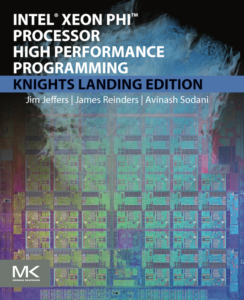“The fact is that Intel has aggressively decided to build a new kind of processor, which includes a number of advances that make it not only the most scalable processor the world has ever seen, but also one of the most versatile, configurable and highly integrated CPUs ever devised,” explains James Reinders as he describes the upcoming Intel® Xeon Phi™ processor.
With that kind of accolade for the forthcoming processor, you wouldn’t be surprised to hear that James and two other Intel experts—Jim Jeffers and Avinash Sodani—have written a book about it called Intel Xeon Phi Processor High Performance Programming: Knights Landing Edition.
 Available in June, the book’s three sections provide programmers the means to accelerate their efforts once they get access to the new processor. Section one focuses on Knights Landing itself with details about the architecture including high bandwidth memory, cluster modes and integrated fabric. Section two takes a look at application programming for the scale of many-core. And Section three, called Pearls, focuses on parallel programming for full applications with examples of optimizations and results using Knights Landing.
Available in June, the book’s three sections provide programmers the means to accelerate their efforts once they get access to the new processor. Section one focuses on Knights Landing itself with details about the architecture including high bandwidth memory, cluster modes and integrated fabric. Section two takes a look at application programming for the scale of many-core. And Section three, called Pearls, focuses on parallel programming for full applications with examples of optimizations and results using Knights Landing.
Knights Landing is a Processor
“Knights Landing is a full-fledged, highly scalable Intel processor,” Reinders explains. “Our vision for this new device is to create a processor that could reach unprecedented levels of performance and parallelism, without giving up programmability. In other words, you can use the same parallel programming models, the same tools, the same binaries that are in common use today by other members of the Intel® Xeon® processor family.
“We think that parallel programming is challenging enough. That’s why we took a different approach compared to other device designs – especially GPUs. Our goal has been to deliver never before attainable processor performance while remaining compatible with existing software and tools.
“One of the outcomes of this approach is to drive home the fact that Knights Landing is a fully featured processor, not just an accelerator or coprocessor,” Reinders says. “It can run anything you would expect a processor to run: C, C++, Fortran, Python, and much more. It really is a full processor!”
The Intel Xeon Phi processor codenamed Knights Landing integrates some pretty aggressive memory capabilities, including MCDRAM. It’s 16GB of very high bandwidth memory that sits right next to the cores for high speed access to all the data required to run data intensive, highly parallel applications. Unprecedented configurability allows it to be operated in different modes. MCDRAM can be treated as a high bandwidth, high-speed cache, or it can be identified as additional memory alongside the DDR4 system memory. Knight Landing also support different cluster modes, allowing it to behave as a cluster with one, two or four NUMA nodes. This wide ranging support allows Knights Landing to act like different machines based on the configuration used to initialize the CPU, the operating system, and the applications. This means that Knights Landing can be adapted to fit application needs.
Machine Learning and Big Data Analytics receive a boost from Knights Landing
Both machine learning and big data analytics tend to apply computational models to large datasets – the constraints have always been the amount of data you can handle given the computational power available to you. Knights Landing is a highly scalable, highly parallel device that is well suited to handle large, complex computations. Because it is a processor, rather than a coprocessor, the Intel Xeon Phi technology provides you with more access to your data. Best of all, you are working with an on-package, very large processor-sized memory without the limits of any offload device (coprocessors or GPUs).
In fact, in many instances, Knights Landing functions more like an Intel Xeon processor-based server –Knights Landing can support 384GB of memory, and, in addition, offers access to 16GB of fast, high bandwidth memory. That’s a perfect combination for working on the very large datasets that are characteristic of machine learning and big data analytics.
Reinders concluded saying, “I think we can safely predict a long and happy life for the evolving Intel Xeon Phi processor family, which includes Knights Landing and all its descendants. Odds are that these next generation processors will play a major role in meeting one of HPC’s most exciting grand challenges – the realization of Exascale.”



























































